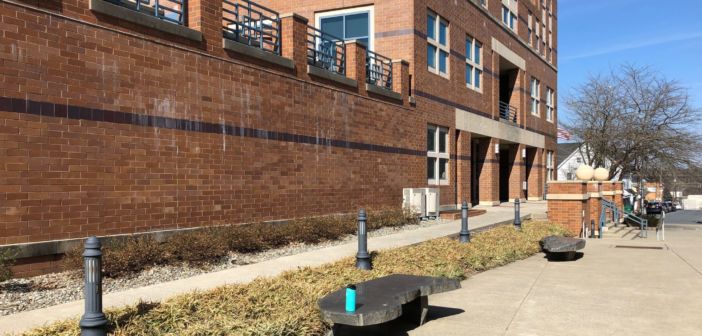With over 2,500 stairs across Lehigh’s Asa Packer campus, physically disabled students might struggle to make their way around the campus.
While Lehigh’s mountainous landscape has been difficult for students with physical disabilities, Lehigh’s Disability Support Services has adapted to accommodate students’ needs over the years.
Mckenzie Dominick, ’22, needed crutches and a boot after breaking her fibula.
“The stairs and the constant inclines were difficult,” Dominick said.
Most buildings on campus require students to climb stairs in order to enter, but some buildings such as Coppee Hall, Williams Hall and Rauch Business Center have built-in ramps alongside the steps to give students with disabilities access.
Buildings such as the University Center, Fairchild-Martindale Library and Linderman Library have elevators inside to aid students with disabilities, but many buildings require students to climb several flights of stairs to access their dorm rooms or classes. All first-year and some sophomore dorms require students to use staircases.
According to Christina D’Aversa, associate director of Lehigh Housing Services, and Maria Zullo, assistant dean of Disability Support Services, Lehigh complies with section 504 of the Federal Rehabilitation Act of 1973, The Fair Housing Act and the Americans with Disabilities Act as amended.
“Lehigh University students with documented disabilities that impact their living environments may request special housing accommodations,” D’Aversa and Zullo said in an email. “Like classroom accommodations, housing accommodations vary according to the individual needs of the student with a disability and may include everything from the need for a larger space to accommodate specialized equipment, access to a kitchen or an emotional support or therapy animal to safety handles in bathrooms and a wheelchair-accessible location.”
During his first week of school, Matthew Apryasz, ’21, parked his car in a friend’s driveway, unaware that there was someone sitting in another car in the driveway. This driver did not see Apryasz or his car, and Apryasz’s left leg got caught between the bumpers of the two cars as the other driver attempted to back out.
The incident left Apryasz wearing a knee brace and using crutches, and he suddenly depended on Lehigh’s Disability Support Services office to help him move around campus.
“I got in contact with them right away,” Apryasz said. “They were super helpful and they coordinated everything.”
His dorm room, located on the third floor of the McClintic-Marshall House, was difficult for him to access due to the stairs and the lack of an elevator. Housing Services provided him with the option of a single room on the first floor of another building. Apryasz turned down this option, but said it was very helpful.
“An interactive process is used to determine what housing accommodations are needed to ensure students with disabilities are able to live, learn and lead at Lehigh,” D’Aversa and Zullo said in an email. “Once housing accommodations are approved, the Office of Disability Support Services notifies Housing Services, which then works one-on-one with students with disabilities to identify housing to best meet each student’s unique needs.”
Apryasz needed three weeks of physical therapy following his incident, and Lehigh coordinated a taxi service to pick him up outside the Health and Wellness Center and drive him to the location.
Lehigh also provided Apryasz with rides to buildings for his classes that were far away.
“I would get driven to and from classes, and most buildings have an elevator in them,” he said.
Olivia LiPuma, ’22, fractured her fifth metatarsal. She needed crutches and a boot.
Again, Lehigh’s Disability Support Services coordinated with Housing Services and Transportation Services to accommodate the needs of students on a campus that was not built to accommodate physical disabilities.
“The most difficult part was once I got into the buildings, there were still steps to arrive at my class,” LiPuma said.
To accommodate her, Lehigh’s Disability Support Services moved her math recitation from the fourth floor of Christmas-Saucon Hall to another building on the first floor so that she wouldn’t have to walk up stairs.
LiPuma said she was also grateful for the transportation to and from classes that Lehigh provided her.






Comment policy
Comments posted to The Brown and White website are reviewed by a moderator before being approved. Incendiary speech or harassing language, including comments targeted at individuals, may be deemed unacceptable and not published. Spam and other soliciting will also be declined.
The Brown and White also reserves the right to not publish entirely anonymous comments.